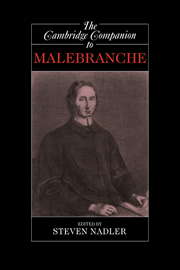Book contents
- Frontmatter
- Introduction
- 1 Malebranche and Method
- 2 Malebranche on the Soul
- 3 Malebranche on Ideas and the Vision in God
- 4 The Malebranche-Arnauld Debate
- 5 Malebranche on Causation
- 6 Metaphysics and Philosophy
- 7 Malebranche's Theodicy
- 8 Malebranche on Human Freedom
- 9 Malebranche's Moral Philosophy
- 10 The Critical Reception of Malebranche, from His Own Time to the End of the Eighteenth Century
- 11 Malebranche's Life and Legacy
- Bibliography
- Index
11 - Malebranche's Life and Legacy
Published online by Cambridge University Press: 28 May 2006
- Frontmatter
- Introduction
- 1 Malebranche and Method
- 2 Malebranche on the Soul
- 3 Malebranche on Ideas and the Vision in God
- 4 The Malebranche-Arnauld Debate
- 5 Malebranche on Causation
- 6 Metaphysics and Philosophy
- 7 Malebranche's Theodicy
- 8 Malebranche on Human Freedom
- 9 Malebranche's Moral Philosophy
- 10 The Critical Reception of Malebranche, from His Own Time to the End of the Eighteenth Century
- 11 Malebranche's Life and Legacy
- Bibliography
- Index
Summary
The twentieth century has done much in the way of transforming the life and work of Malebranche into a cultural legacy. The effects of this transformation are first making themselves felt only now, at the end of the century. At the very least, the century that begins with the year 2000 will have at its disposal all it needs to study and explain his oeuvre, if not to grasp it in full. The history of philosophy is now fully equipped and ready to take possession of that oeuvre and thereby procure for itself entirely new opportunities. The publication of the Oeuvres completès provides us with all the available texts attributable to Malebranche; in the past fifty years only a single new letter has been found! The method used in compiling this monumental collection gathered together the variations of all the recorded editions. I am not speaking of handwritten manuscripts,- for as much as we can avail ourselves of interesting paleographic approaches in the case of Leibniz and Descartes, in the case of Malebranche we cannot return to the primordial state of the texts' composition.
However, in fact, Malebranche considered the previous editions of his books to be the rough drafts - so much so that the work published during his lifetime is only one long rough draft worth all the unpublished writings at Hanover. Evidence for this is found in the fact that there is no permanent dogmatism in any of these writings. The author's retrospection, as well as his conflicts with other philosophers, led him to take account of the objections that were made to him in a way quite different from that in which Descartes responded to the objections that he received. Descartes' thought remained subservient to the necessity of what he was demonstrating; it progresses in an involuted way.
- Type
- Chapter
- Information
- The Cambridge Companion to Malebranche , pp. 288 - 304Publisher: Cambridge University PressPrint publication year: 2000



